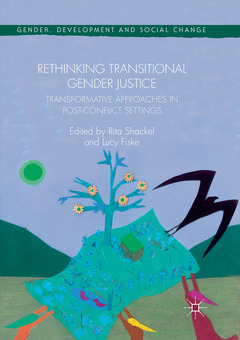Description
Rethinking Transitional Gender Justice, 1st ed. 2019
Transformative Approaches in Post-Conflict Settings
Gender, Development and Social Change Series
Coordinators: Shackel Rita, Fiske Lucy
Language: English
Subjects for Rethinking Transitional Gender Justice:
Publication date: 12-2018
Support: Print on demand
Publication date: 10-2018
Support: Print on demand
Description
/li>Contents
/li>Biography
/li>Comment
/li>
This book draws together established and emerging scholars from sociology, law, history, political science and education to examine the global and local issues in the pursuit of gender justice in post-conflict settings. This examination is especially important given the disappointing progress made to date in spite of concerted efforts over the last two decades. With contributions from both academics and practitioners working at national and international levels, this work integrates theory and practice, examining both global problems and highly contextual case studies including Kenya, Somalia, Peru, Afghanistan and DRC. The contributors aim to provide a comprehensive and compelling argument for the need to fundamentally rethink global approaches to gender justice.
Rita Shackel is Associate Professor of Law at The University of Sydney Law School, Australia. Her research program is broadly focused on evaluation and reform of legal and social justice processes, with a specific focus on sexual and gender based violence and the needs of victims and survivors especially women and children.
Lucy Fiske is Senior Lecturer in Social and Political Sciences at the University of Technology Sydney, Australia. Her research focuses on forced migration, human rights and gender justice.
Recognizes both the importance of improving gender justice in conflict and post-conflict settings and the disappointing progress to date
Draws together established and emerging scholars from sociology, law, history, political science and education
Provides a compelling argument for the need to fundamentally rethink global approaches to gender justice in post conflict societies
The authors live and work on every continent, enabling diverse perspectives on different conflicts




